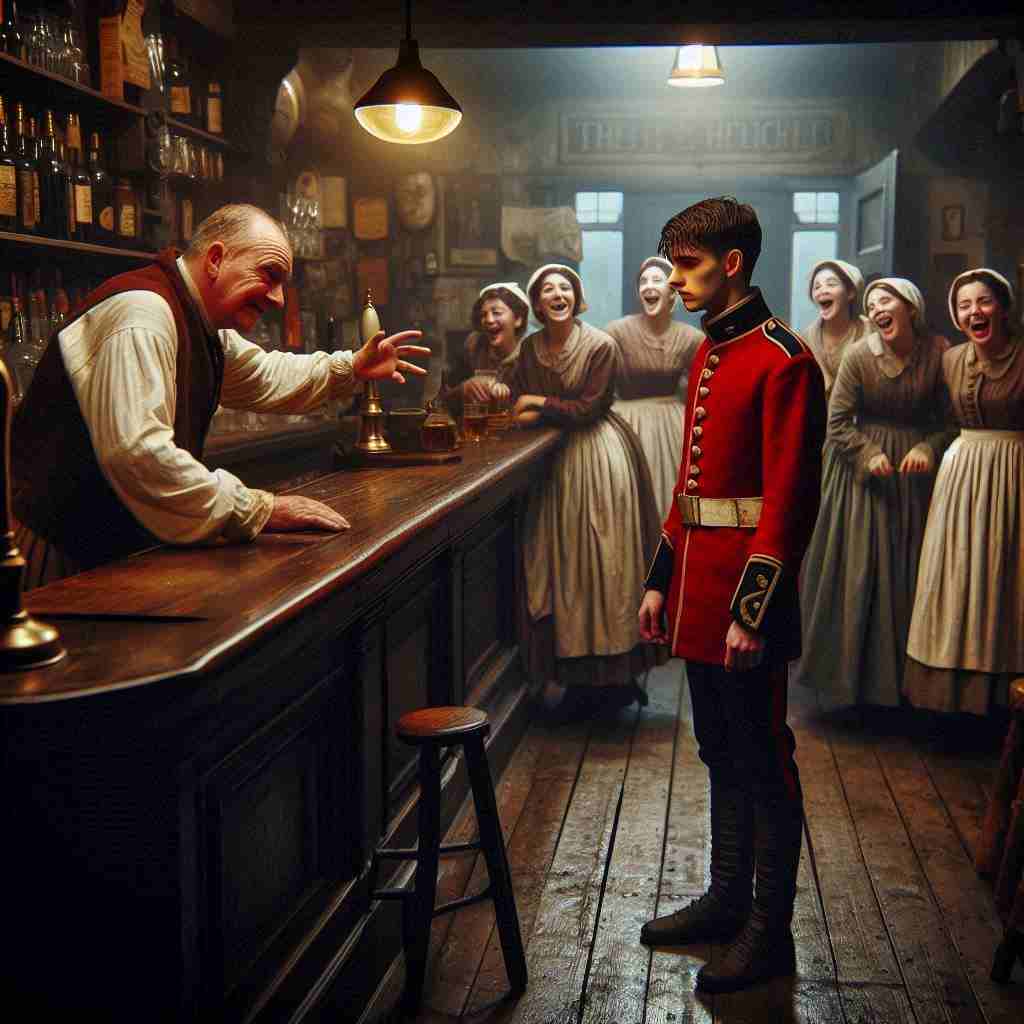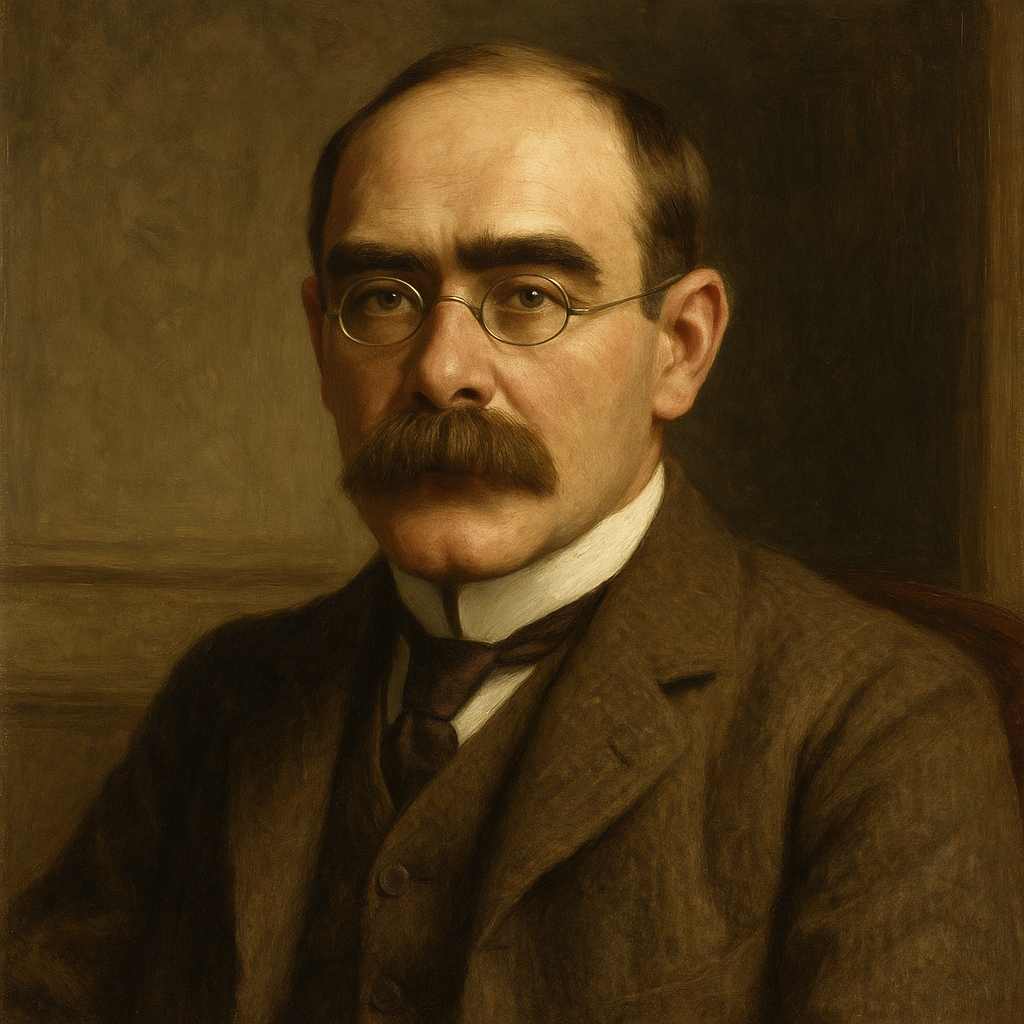Tommy
Rudyard Kipling
1865 to 1936

Want to track your favorites? Reopen or create a unique username. No personal details are required!
I went into a public-'ouse to get a pint o' beer,
The publican 'e up an' sez, "We serve no red-coats here."
The girls be'ind the bar they laughed an' giggled fit to die,
I outs into the street again an' to myself sez I:
O it's Tommy this, an' Tommy that, an' "Tommy, go away";
But it's "Thank you, Mister Atkins", when the band begins to play,
The band begins to play, my boys, the band begins to play,
O it's "Thank you, Mister Atkins", when the band begins to play.
I went into a theatre as sober as could be,
They gave a drunk civilian room, but 'adn't none for me;
They sent me to the gallery or round the music-'alls,
But when it comes to fightin', Lord! they'll shove me in the stalls!
For it's Tommy this, an' Tommy that, an' "Tommy, wait outside";
But it's "Special train for Atkins" when the trooper's on the tide,
The troopship's on the tide, my boys, the troopship's on the tide,
O it's "Special train for Atkins" when the trooper's on the tide.
Yes, makin' mock o' uniforms that guard you while you sleep
Is cheaper than them uniforms, an' they're starvation cheap;
An' hustlin' drunken soldiers when they're goin' large a bit
Is five times better business than paradin' in full kit.
Then it's Tommy this, an' Tommy that, an' "Tommy, 'ow's yer soul?"
But it's "Thin red line of 'eroes" when the drums begin to roll,
The drums begin to roll, my boys, the drums begin to roll,
O it's "Thin red line of 'eroes" when the drums begin to roll.
We aren't no thin red 'eroes, nor we aren't no blackguards too,
But single men in barricks, most remarkable like you;
An' if sometimes our conduck isn't all your fancy paints,
Why, single men in barricks don't grow into plaster saints;
While it's Tommy this, an' Tommy that, an' "Tommy, fall be'ind",
But it's "Please to walk in front, sir", when there's trouble in the wind,
There's trouble in the wind, my boys, there's trouble in the wind,
O it's "Please to walk in front, sir", when there's trouble in the wind.
You talk o' better food for us, an' schools, an' fires, an' all:
We'll wait for extry rations if you treat us rational.
Don't mess about the cook-room slops, but prove it to our face
The Widow's Uniform is not the soldier-man's disgrace.
For it's Tommy this, an' Tommy that, an' "Chuck him out, the brute!"
But it's "Saviour of 'is country" when the guns begin to shoot;
An' it's Tommy this, an' Tommy that, an' anything you please;
An' Tommy ain't a bloomin' fool -- you bet that Tommy sees!
Rudyard Kipling's Tommy
Introduction
Rudyard Kipling's poem "Tommy" stands as a poignant critique of the societal treatment of soldiers in Victorian England. Published in 1890 as part of Kipling's "Barrack-Room Ballads," this piece offers a scathing commentary on the dichotomy between the public's perception of soldiers during peacetime and their elevated status during times of conflict. Through the voice of Tommy Atkins, the archetypal British soldier, Kipling masterfully exposes the hypocrisy and ingratitude of a society that simultaneously relies upon and disparages its military personnel. This analysis will delve into the poem's structure, language, themes, and historical context to unravel its enduring relevance and artistic merit.
Structure and Form
"Tommy" is composed of five stanzas, each following a consistent pattern: four lines of narrative followed by a four-line chorus. This structure mirrors the call-and-response tradition of military marching songs, creating a rhythmic cadence that echoes the soldier's experience. The use of alternating rhyme scheme (ABCB) in the narrative sections contrasts with the more rigid DDED pattern of the chorus, perhaps symbolizing the tension between the soldier's individual experiences and the collective societal response.
The repetitive nature of the chorus, with slight variations in each stanza, serves multiple purposes. It reinforces the central theme of the poem, creates a sense of mounting frustration, and mimics the cyclical nature of public opinion towards soldiers. The variation in the final line of each chorus ("when the band begins to play," "when the trooper's on the tide," etc.) cleverly ties the refrain to the specific scenario described in each stanza, creating a sense of progression within the repetition.
Language and Dialect
Kipling's use of colloquial language and dialect is crucial to the poem's authenticity and impact. The speaker's voice is rendered in a working-class vernacular, complete with dropped 'h's, abbreviated words, and phonetic spellings that capture the accent of the common soldier. This linguistic choice not only adds verisimilitude but also serves to highlight the class divide between the soldiers and the society they protect.
Examples such as "public-'ouse" for "public house," "sez" for "says," and "conduck" for "conduct" immerse the reader in Tommy's world, making his experiences more immediate and relatable. The contrast between this rough dialect and the more formal language used to describe society's treatment of soldiers ("Thank you, Mister Atkins," "Special train for Atkins") underscores the social gulf that exists between the two groups.
Themes and Social Commentary
The central theme of "Tommy" is the stark contrast between society's treatment of soldiers during peacetime and war. Kipling explores this through a series of vignettes that illustrate the discrimination and disrespect faced by soldiers in everyday life. The pub that refuses service, the theater that relegates them to the gallery, and the general mockery of their uniforms all paint a picture of a society that views its defenders with disdain when they are not immediately needed.
This hypocrisy is bitingly exposed in lines such as "O it's Tommy this, an' Tommy that, an' 'Tommy, go away'; / But it's 'Thank you, Mister Atkins,' when the band begins to play." The shift from familiar, dismissive address to respectful gratitude when danger looms is a powerful indictment of societal double standards.
Kipling also touches on the dehumanization of soldiers, portrayed as either saints or sinners with no middle ground. The line "We aren't no thin red 'eroes, nor we aren't no blackguards too" asserts the humanity and complexity of soldiers, rejecting both idealization and vilification. This theme is further developed in the stanza addressing the soldiers' living conditions and behavior, acknowledging their flaws while asserting their right to fair treatment.
Historical Context
To fully appreciate "Tommy," one must consider its historical context. Written during the late Victorian era, the poem reflects the complex relationship between British society and its military in the aftermath of the Crimean War and amid ongoing colonial conflicts. The reference to the "thin red line" alludes to the Battle of Balaclava in 1854, where a red-coated Scottish regiment held off a Russian cavalry charge, becoming a symbol of British military valor.
The mention of "The Widow's Uniform" is a reference to Queen Victoria, whose long period of mourning for Prince Albert coincided with significant military reforms and conflicts. This allusion adds layers of meaning, touching on issues of national identity, imperial power, and the personal cost of military service.
Imagery and Symbolism
Kipling employs vivid imagery to convey the soldier's experience. The contrast between the "drunken civilian" given preferential treatment and the sober soldier sent to the gallery paints a stark picture of social injustice. The image of soldiers "paradin' in full kit" juxtaposed with being "hustled" when "goin' large a bit" highlights the public's inconsistent expectations of military comportment.
Symbolically, the recurring motifs of music ("when the band begins to play," "when the drums begin to roll") serve as harbingers of war, marking the transition from peacetime disdain to wartime adulation. This musical imagery also underscores the performative nature of public patriotism, contrasting sharply with the daily reality of a soldier's life.
Narrative Voice and Perspective
The choice to narrate the poem from Tommy's perspective is crucial to its impact. By giving voice to the common soldier, Kipling creates an intimate, first-hand account that challenges the reader's preconceptions. The direct address to the reader in lines like "An' if sometimes our conduck isn't all your fancy paints" implicates the audience in the societal attitudes being critiqued.
The shift in the final stanza to a more assertive tone, with Tommy directly addressing society's attempts at reform ("We'll wait for extry rations if you treat us rational"), demonstrates a growing self-awareness and demand for respect. The concluding line, "An' Tommy ain't a bloomin' fool -- you bet that Tommy sees!" serves as both a warning and a call for recognition of the soldier's humanity and intelligence.
Literary Techniques
Kipling's mastery of poetic technique is evident throughout "Tommy." The use of anaphora in the chorus ("For it's Tommy this, an' Tommy that") creates a rhythmic insistence that mirrors the relentless nature of societal prejudice. The juxtaposition of peacetime and wartime attitudes is emphasized through antithesis, contrasting phrases like "Tommy, go away" with "Thank you, Mister Atkins."
The poem also employs irony to great effect, particularly in lines like "Yes, makin' mock o' uniforms that guard you while you sleep / Is cheaper than them uniforms, an' they're starvation cheap." This bitter observation highlights the true cost of military service against the backdrop of public ingratitude.
Conclusion
"Tommy" stands as a powerful indictment of societal hypocrisy and a plea for recognition of the humanity of those who serve in the military. Through its masterful blend of form, language, and theme, the poem transcends its specific historical context to speak to broader issues of social justice, gratitude, and the complex relationship between a nation and its defenders.
Kipling's ability to give voice to the common soldier while simultaneously critiquing broader societal attitudes demonstrates his keen understanding of both the individual and collective psyche. The poem's enduring relevance lies in its unflinching examination of the gap between professed values and actual treatment of those who serve, a theme that resonates well beyond the Victorian era into our contemporary discourse on military service and societal responsibility.
In conclusion, "Tommy" is not merely a poem about soldiers, but a complex exploration of human nature, social dynamics, and the often painful disparity between rhetoric and reality. Its artistry lies not just in its technical proficiency, but in its ability to challenge, provoke, and ultimately humanize its subject, inviting readers across generations to reflect on their own attitudes and the true meaning of service and gratitude.
This text was generated by AI and is for reference only. Learn more
Want to join the discussion? Reopen or create a unique username to comment. No personal details required!



Comments
No comments yet. Be the first to comment!